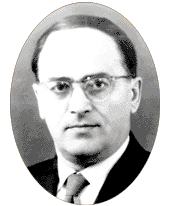
Alexei Zinovievich Petrov (1910 - 1972)
Alexei Zinovievich Petrov was born on October 28, 1910, in the village of Koshki in Samara Gubernya within the Russian Empire.
In 1932, he entered the Department of Physics and Mathematics of Kazan University, where he became a pupil of Prof. Peter Schirokov. Following many long conversations with Schirokov, Alex Petrov selected the topic for his PhD Thesis. The resulting manuscript became the basis for famous book Einstein Spaces. In which he continued to study Einstein spaces and was led to the idea of classifying such spaces according to the algebraic structure of the curvature tensor. Today, this is known as the Petrov's classification.
Aside from his classification system, Petrov was also interested in the other fields related to Einstein's theory of relativity. He tried to apply the methods of group theory to these problems. Petrov was also interested in gravitational waves. There was a long-time conflict between Petrov and the administration of Kazan University: the Soviet bureaucracy non-allowed independent thinking and behaviour that was very specific to Petrov's individuality. In 1969, this conflict has reached the apogee.
As happily Petrov had good friends amongst the fluent scientists at Kiev, the capital city of Ukraine. The friends elected him in 1969 a full member of the Academy of Sciences of the Ukraine at Kiev, and invited to join the academic staff of the Institute of Theoretical Physics.
It can be said that this train of Petrov's life, in conjunction with his old wounds and generally poor health, slowly killed him. He suffered several heart attacks. Tragically, he died from the complications of a blood clot on May 09, 1972, at a hospital in Kiev. He was only 61.